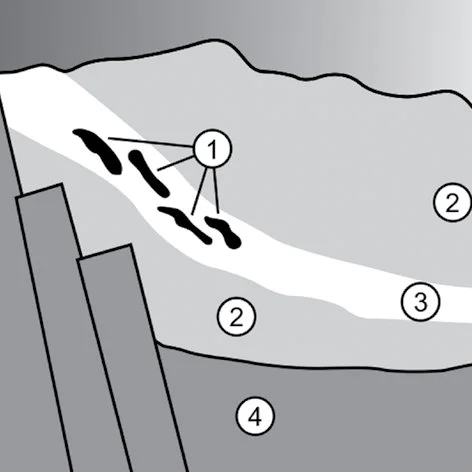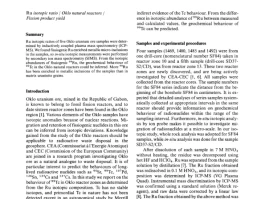I saw the headline the other day, and I’m sure you did too. An analyst note from Sarfatti Investment Research, coolly declaring that Terrestrial Energy is a "Terrestrial Energy: The Nuclear SMR Play To Likely Surpass Oklo's Aurora - Seeking Alpha." The markets reacted as they always do: a flurry of chatter, a dip in the `oklo stock price`, and a wave of analysts sharpening their pencils to declare a winner in the race for our energy future.
And when I first read that note, I didn't feel dismay for Oklo; I felt this incredible surge of excitement. Because this is the kind of breakthrough that reminds me why I got into this field in the first place. Wall Street is treating this like a horse race, placing bets on which company will cross the finish line first. They’re asking the wrong question. This isn’t about one company "surpassing" another. This is about the starting gun firing on a revolution that will redefine the 21st century.
What we're witnessing isn't a zero-sum battle for market share. It’s the Cambrian explosion of a new technological ecosystem. Thinking about Oklo versus Terrestrial Energy is like asking in 1982 whether Apple or Commodore would "win" personal computing. The real winner wasn't a company; it was us. It was humanity, which gained a tool that reshaped society itself. The competition was the engine, not the destination.
The Engine of Progress Isn't a Winner, It's the Race Itself
Let’s get grounded for a second. The technology at the heart of this is the Small Modular Reactor, or SMR. It’s a term that gets thrown around a lot, but what does it actually mean? These are advanced, miniaturized nuclear fission reactors—or, to put it more simply, think of them as self-contained 'nuclear batteries' that can be built in a factory and shipped to wherever clean, reliable power is needed. No more billion-dollar, decade-long construction projects. Just clean, dense, 24/7 energy on demand.
The Oklo Aurora reactor is a beautiful piece of engineering, designed to be small, safe, and efficient. The fact that a competitor like Terrestrial Energy is also making huge strides isn't a threat to this vision; it's the ultimate validation of it. It tells us the core idea is so powerful, so necessary, that the best minds in the world are now competing to perfect it.
This is the beautiful, chaotic, and absolutely essential nature of innovation. One team develops a breakthrough, another refines it, and a third finds an application no one ever imagined. The pressure of competition forces everyone to be better, faster, and safer. Does anyone seriously believe we’d have the advanced AI chips from Nvidia (`nvda`) or AMD today if they hadn’t been locked in a decades-long battle for supremacy? That rivalry didn't produce a single "winner"; it produced a world of unimaginable computing power for all of us. Why should the future of `smr stock` and clean energy be any different?

Beyond the Ticker Symbol: A New Blueprint for Civilization
So let's pull the camera back from the blinking lights of the `oklo stock` ticker and look at the horizon. What does a world powered by SMRs actually look like?
Imagine a remote community in Alaska, no longer dependent on dirty, expensive diesel fuel, but powered by a silent, humming Aurora reactor that provides decades of clean energy and heat. Imagine massive desalination plants on coastlines, providing endless fresh water to drought-stricken regions, their operations guaranteed by a reliable, carbon-free power source. Imagine the colossal data centers needed to power the next generation of AI—the very engines of our digital world—running not on fossil fuels, but on a fleet of SMRs that make their energy footprint virtually zero. The speed of this is just staggering—it means the gap between our current energy constraints and a future of energy abundance is closing faster than we can even comprehend.
I can almost see it: a small, sleek Oklo installation sitting quietly on the outskirts of a research base on Mars, its soft internal glow a beacon of human ingenuity against the red dust. That’s the scale of the dream we’re talking about here.
Of course, this isn't a fairy tale. This is nuclear technology, and with it comes an immense and non-negotiable responsibility. The questions of waste disposal, security, and public trust are not afterthoughts; they are central to the entire endeavor. How do we build a global framework to ensure this power is used to unite us, not divide us? How do we design systems so robust that they earn the absolute confidence of the public? These are the challenges we must meet with the same passion and brilliance that we bring to the engineering.
This Isn't About One Company, It's About Our Collective Future
So, when I see analysts pitting one `oklo nuclear` design against another, I have to smile. They're missing the forest for the trees. The debate over whether Oklo or Terrestrial Energy will capture a larger market share in 2035 is a footnote in a much grander story.
The real story is that we are finally building the tools to solve the foundational challenge of our time: clean, abundant energy for everyone. The competition is the fire that forges those tools. Some companies will thrive, others may falter. But the technology, the idea itself, will move forward, propelled by the collective ambition of all who are in the race.
The question you should be asking isn't "Which SMR company will win?" The real question is, "What kind of world are we going to build when energy is no longer a limitation, but a birthright?"


